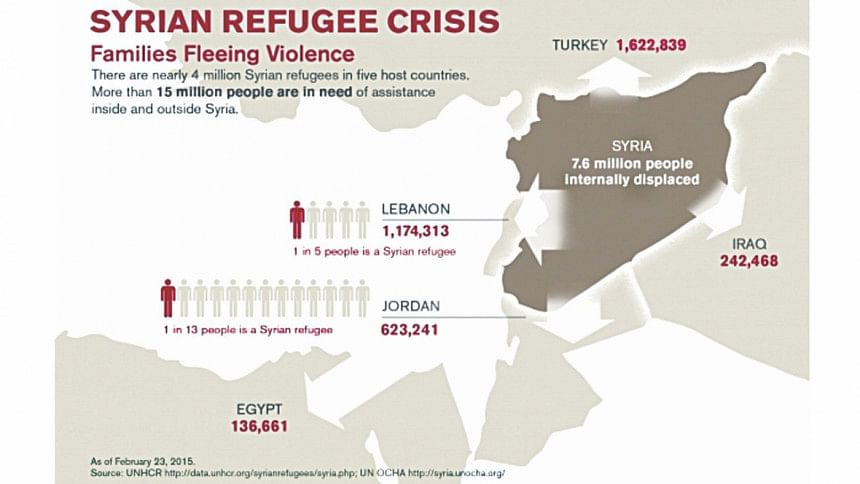GLOBAL RESPONSIBILITY to protect Syrian refugees

INFLUENCED by the pro-democracy movements in several Middle East countries, the nationals of Syria started peaceful demonstrating against the President Asad regime in the beginning of 2011. Subsequently it led to a terrible armed conflict or war affecting millions of people inside and outside Syria. The war is now helping to fuel the refugee crisis beyond Syria in many European countries. Today almost half of the Syrian population has been displaced from their place of residence. As of February 2015, around 7.6 million were estimated to be internally displaced, and near four million refugees had crossed into Turkey, Lebanon, Iraq, Egypt and Jordan. And thousands of Syrians are fleeing their country every day.
According to United Nations, Turkey's Syrian refugee population was more than 1.7 million as of mid-March 2015. Five neighbouring countries of Syria, namely, Lebanon, Jordan, Turkey, Iraq and Egypt host 97% of the refugees. Despite the enormous scale of the refugee crisis, the international community has been failing miserably to support refugees from Syria. The provision of resettlement and humanitarian admission places one of the principal means by which the international community can show solidarity with countries hosting large number of refugees and provide urgent safety and protective measures for the most vulnerable refugees. Unfortunately such initiatives remain extremely limited.
Life in the camps is often difficult, cramped, and unsafe, with few prospects for work or education. Refugees need food, clothing, health assistance, shelter, and basic household and hygiene items. They need reliable supplies of clean water, as well as sanitation facilities. Children need a safe, protective environment and a chance to play and go to school. Adults need employment options in case of long-term displacement.
According to article 14 of the Universal Declaration of Human Rights 1948, everyone has the right to seek and to enjoy in other countries asylum from persecution. Individual countries should respect their legal obligations towards refugees and asylum seekers, including allowing them to enter their territories but there must also be a fundamental change in international cooperation on refugee crisis. The international community must share the responsibility for assisting and hosting refugees, including by resettling refugees who need it and adequately funding humanitarian programmes in other countries. The world's 86% of refugees are now in the developing countries.
The 1951 Convention relating to the Status of Refugees is the primary international treaty governing the status and rights of refugees around the world, and incorporates the internationally accepted definition of 'refugee'. The Convention defines a refugee as a person who, “owing to well founded fear of being persecuted for reasons of race, religion, nationality, membership of a particular social group or political opinion, is outside the country of his nationality and is unable or, owing to such fear, is unwilling to avail himself of the protection of that country.” The principle of 'non-refoulement' is the core obligation of all State Parties to the Refugee Convention, and refers to the prohibition against returning an asylum-seeker to his or her country of prior residence. This principle of 'non-refoulement' is considered to be a jus-cogens (peremptory) norm of international law, and is also binding even upon those States that have not ratified the Convention.
The global refugee crisis is primarily a result of conflicts and widespread human rights violations. The Refugee Convention also establishes the principle of responsibility sharing, the idea that the international community must work together to address refugee crises so that no one country, or a small number of countries, has to cope alone. The obligation of individual countries to give protection and assistance to refugees, coupled with the responsibility of the international community to act collectively in the case of large refugee crisis, is essential for the protection of the refugees.
Undeniably the refugees are among the most vulnerable people in the world. The humanitarian factor is one of the crucial aspects of the Syrian conflict that has lasted now for nearly four years. More than half of the refugees outside the country consist of children and youth under the age of eighteen. A majority of these refugees struggle to survive under challenging conditions outside the refugee camps. Syrian refugees have been struggling to find basic necessities such as security, food, shelter and health services, let alone basic modes of comfort. In this refugee crisis, the world community should not be escaped themselves from carrying out their minimum responsibility towards the refugees. One fact is very simple: millions of Syrians now need prompt and effective global assistance.
THE WRITER IS A STUDENT OF LL.M.
SOUTH ASIAN UNIVERSITY, INDIA.

 For all latest news, follow The Daily Star's Google News channel.
For all latest news, follow The Daily Star's Google News channel. 



Comments